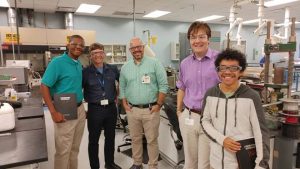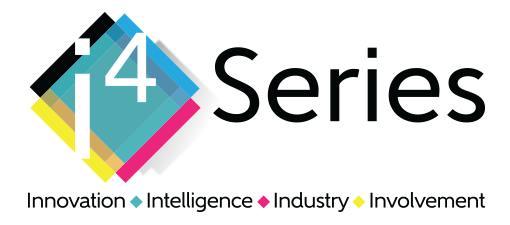Does your business, organization, or institution have complex problems to solve? What if you or your research team could work with some of the brightest young minds in South Carolina? You can innovate with students at the SC Governor’s School for Science & Mathematics! GSSM is looking for more innovators to contribute to the development of their talented students. It’s a public boarding school for gifted 10th, 11th, and 12th-graders located in Hartsville, SC, where students study everything from robotics to biochemistry, and beyond. There were just 128 students in its first graduating class in 1990. Now the school is impacting 4011 students by expanding on campus, offering summer camps, and increasing virtual programs.

Left to right: Stephen Sartor (Accelerate ’22), Dr. Craig Nies (AVX), Dr. Joshua Witten (GSSM), Josh Campbell (Residential ’20), and Tremaine Richardson (Residential ’22).
GSSM students are required to complete a 6-week research and inquiry project in order to graduate. Recently, students have worked with AVX (Fountain Inn), Integrated Systems, Inc (Darlington), Nephron Pharmaceuticals (West Columbia), Zverse (Columbia), and CPM Federal Credit Union, as well as industry adjacent academic institutions such as Clemson University International Center for Automotive Research, Clemson University Pee Dee Research and Education Center, and Dominion Energy Innovation Center.
Examples of their work include research by students Stephen Sartor and Tremaine Richardson, pictured left, who worked at AVX with GSSM Alum Josh Campbell ’20 to develop methods to more consistently prepare materials for the assembly of capacitors. Josh conducted his GSSM research and inquiry project at AVX in the Summer of 2019 under Dr. Craig Nies. He has worked as a paid intern each summer since.
📧 Interested business leaders can email Dr. Josh Witten, GSSM Director of Research & Inquiry, at witten@governors.school.
Get Involved!
GSSM President Danny Dorsel first told us about these research opportunities at the September 15, “Innovation. Investment. Vison.” i4Series event. We reached out to his colleague Dr. Witten afterward to get more specifics about the program.
-
What types of businesses/manufacturers do the school partner with?
We have partnered with a diverse set of businesses over the years including solid-state electronics manufacture, robotics, banking, entrepreneurship incubators, pharmaceuticals manufacturing, software engineering, biomedical research, veterinarians, architecture firms, and more.
-
Are there any specific requirements that must be met for a business to qualify to work with students?
Businesses will need to have an HR process or be able to develop one that will enable their employees to work with under-18 students. Although our students are frequently described as being comparable to undergraduate students (or better) in terms of educational background and work ethic, they are technically minors which can create specific challenges administratively. It is important that in providing mentorship that businesses can ensure that the student(s) will be able to be appropriately supervised while working on site. This does not mean someone constantly looking over their shoulder, but that a student should not be working alone or in isolated one-on-one situations with an adult for safety and liability protection.
-
Is it only certain types of research?
Our view is that research is a process, not a field. Our students also have extremely diverse interests and are often motivated to expand those interests into areas with which they are not familiar. Therefore, we are open to potential projects from any field, provided the work can be conducted safely by a student.
-
Besides the obvious, what is the incentive for businesses to partner with GSSM students for research projects?
In addition to the contribution to the development of these talented young people and the demonstrable contribution to their community, working with our students is a great opportunity for organizations to test and develop the leadership potential in their own employees. Learning to manage people and projects is a significant challenge. Working with our students not only provides development opportunities to students but also opportunities for professional development in their mentors. The potential, independence, and work ethic for which GSSM students are known make them ideal for providing early leadership experience (and leadership talent identification) for both businesses and academic research groups.
-
Are there legal considerations? For example, if a student plays a key role in developing a product, system, or service, how does that affect intellectual property rights?
GSSM students working with an organization are unpaid interns or volunteers at the organization depending on the organization and their HR processes. Therefore, all the intellectual property rights would be held by the organization in line with their own internal policies. GSSM students receive academic credit for the educational experience. Some organizations that do business in jurisdictions outside SC or have policies that do not allow unpaid internships will provide paid internships. GSSM students may participate in paid internships. GSSM cannot subsidize paid internships. We would also ask that businesses providing paid internships work with us on an application process for these experiences to enable equitable access to the opportunity.
-
What’s the commitment as far as the number of hours with the student and reporting requirements?
GSSM students are generally expected to be engaged in their project throughout the normal working day (eg., 9 AM – 5 PM) five days a week for six weeks during the summer. Most students in the Class of 2023 will be participating in research from June 6 – July 15, 2022. Students will have periodic check-ins during the experience with a member of the GSSM staff. We also try to visit every research site in person during the experience. In order to receive academic credit and complete their graduation requirement, GSSM students are required to complete a research and inquiry portfolio, which consists of a title and abstract, a one-minute elevator pitch, a personal impact statement including a plain-language summary of the project, and a ten-minute oral presentation at our Annual Research Colloquium. We ask the research mentors to provide guidance to the students in creating these materials with the understanding that there may be elements of a project that cannot be communicated due to intellectual property or other considerations.
Visit the GSSM website for more information about student research opportunities.

Recent Comments